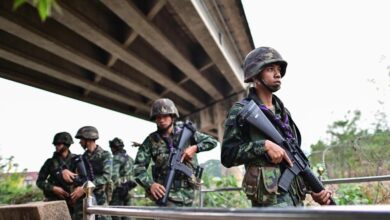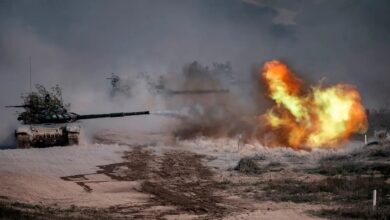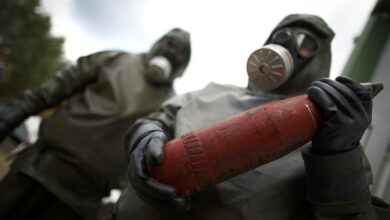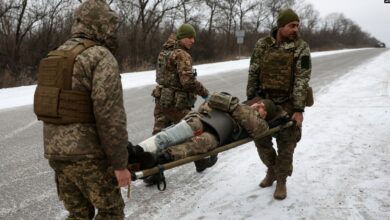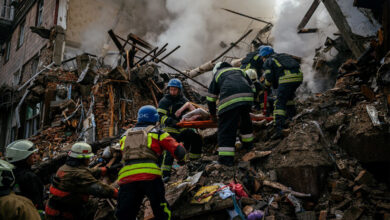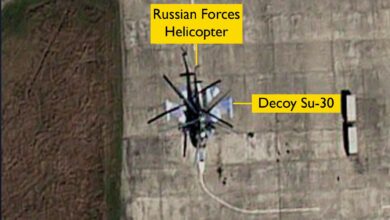
Allegations of biological and chemical warfare in Ukraine are coming thick and fast.
A week ago, Russian foreign ministry spokesperson Maria Zakharova accused Ukraine of developing biological weapons with the assistance of the United States. The US vehemently denies these claims, arguing that it is actually Russia who wants to use these weapons of mass destruction.
US Press Secretary Jan Psaki published a number of tweets stating that Russia is using these allegations as propaganda in a bid to pave the way for its own use of biological and chemical arms.
We took note of Russia’s false claims about alleged U.S. biological weapons labs and chemical weapons development in Ukraine. We’ve also seen Chinese officials echo these conspiracy theories.
— Jen Psaki (@PressSec) March 9, 2022
Accusing Others of Poisonous Warfare
It would not be the first time that Russia has accused another state of poisonous warfare as a means of justifying these weapons’ use, either by itself or an ally.
When President Bashar al-Assad used chemical weapons in Syria, Vladimir Putin backed up the controversial allegation that it was, in fact, the rebels who had used them in those specific attacks. This claim was strongly disputed.
Yet Russia had made this type of allegation long before Syria.
During the Korean War, the Soviet Union alleged that the US had carried out biological violence in Korea and China. The US retaliated by stating that the USSR had only made the allegations as they were preparing to employ biological weapons themselves.
US officials described this as a classic Soviet trick: accuse the enemy of what you want to do yourself to legitimize your actions when you have done it.
But would Putin use these contentious and highly destructive weapons?
Controversial Weapons in Ukraine
Putin is already said to have employed other extremely controversial weapons, such as thermobaric weapons (also known as a vacuum bomb) and cluster bombs.
These attacks have not been limited to military targets such as weapon stockpiles but have also been used against civilians. Attacks have been recorded against civilian targets such as hospitals and a maternity ward.

There are also reports that Putin has now used a chemical weapon: white phosphorus.
Whether white phosphorus counts as a chemical weapon is subject to dispute. The 1993 Chemical Weapons Convention (CWC) – which bans the possession and use of chemical arms – permits states to retain certain chemicals regularly used for commercial, agricultural, and industrial purposes. This includes phosphorus.
Yet the CWC states in the General Purpose Criterion that any chemical used explicitly to harm or kill can still be considered a weapon. Admittedly, that statement is extremely vague. However, the CWC can still provide the grounds to argue that Putin has resorted to chemical warfare.
Chemical Warfare
Chemical weapons can be effective at breaking down enemy defenses. Assad used chemical arms in Syria for precisely this reason. Chemicals were employed against rebel defenses when conventional bombings had not been sufficient to overcome them – for example, at Douma near Damascus in 2018.
Putin wants this current invasion over with as quickly as possible and chemical weapons could help achieve this.
If Putin has employed white phosphorous, it would be no surprise if he escalated to using other forms of chemical agents, such as nerve agents.

Russia claims that it eliminated its entire chemical arsenal in 2017. Yet the attempted assassinations of Sergei Skripal in 2018 and Alexei Navalny in 2020 with nerve agents strongly suggest that this is not the case.
These attacks took place after the claim that Russia had disarmed – although Russia denies that it was involved in either assault. On that basis, we can assume that Putin has access to chemical stockpiles which could be deployed in Ukraine.
Biological Warfare
If chemical weapons are on the table, is biological warfare?
Russia does have the capacity to use biological weapons if it wants. Russia started developing a biological program in the 1920s, which was expanded during the Cold War under the name Biopreparat. The program was kept secret from the rest of the world until 1992, when Boris Yeltsin finally admitted it existed.
Russia has signed the 1972 Biological Weapons Convention, which requires it to disarm. It is unclear how far that has actually happened, and analysts claim that it still possesses a large-scale program.
Yet there is no definitive evidence that Russia has ever used biological weapons. While the US accused the Soviets of wanting to use these armaments in Korea, it has not been proven that they did.
Biological weapons can also be more difficult to use than chemical arms, mainly because biological agents are contagious. Contagion means that if a state uses a biological weapon, there is every chance that their own troops will catch the disease they have released. This is called the “boomerang effect” and may deter Putin.
The international rules against biological weapons can also be considered stronger than those against chemical aggression.
Chemical weapons have been used, whereas states have not been shown without doubt to have used biological arms in modern times. As such, biological weapons use in Ukraine is unlikely.
Crossing the Line
Yet we also cannot ignore that Putin has shown that he is willing to use controversial and highly destructive weapons to overcome resistance to his invasion. At the very least, there is a notable chance that he would use chemical weapons in the future.
The world then needs to decide what it will do if Putin does escalate. The US and its allies carried out airstrikes in Syria after the use of chemical weapons there. Would they be prepared to do the same if Putin also crosses that line?

Dr. Michelle Bentley is Reader in International Relations and Director of the Centre of International Public Policy at Royal Holloway, University of London.
The views and opinions expressed here are those of the author and do not necessarily reflect the editorial position of The Defense Post.
The Defense Post aims to publish a wide range of high-quality opinion and analysis from a diverse array of people – do you want to send us yours? Click here to submit an op-ed.


